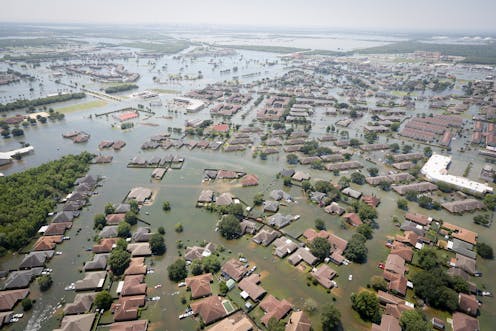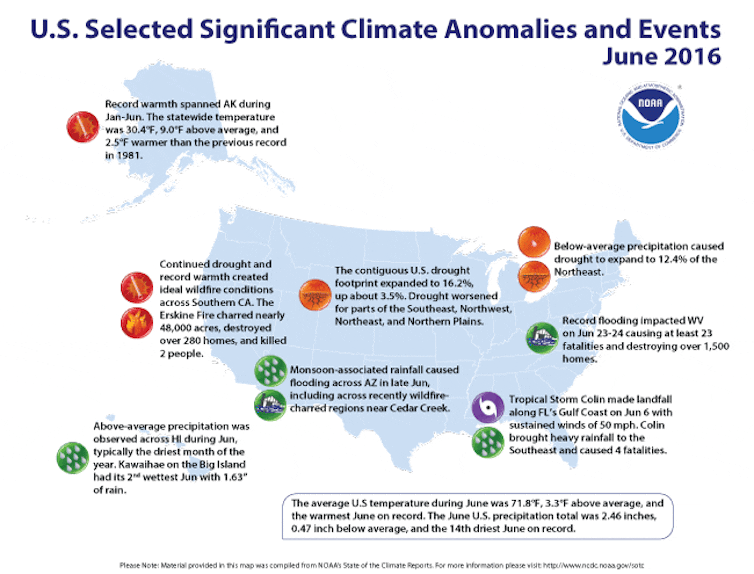The climate science report Trump hoped to ignore will resonate outside of Washington, DC
On Nov. 2 the White House posted a detailed climate science report without comment. The Trump administration is unlikely to heed it, but it could boost state, local and private sector action.

Last week, without comment, the White House published a study officially titled the Climate Science Special Report. Contrary to many statements and positions articulated by President Trump, members of his Cabinet, his surrogates and his supporters, the report clearly states that Earth’s climate is changing, and “it is extremely likely that human influence has been the dominant cause of the observed warming since the mid-20th century.”
The study was prepared pursuant to a 1990 law in which Congress directed government scientists to prepare and transmit a report to the president and Congress every four years assembling and interpreting findings from the U.S. Global Change Research Program. This initiative draws together work from 13 federal agencies that conduct or use research on global change and its impacts, in areas ranging from agriculture to national defense. The report is part I of the Fourth National Climate Assessment, with more to follow.
Along with many other others, I was concerned that the Trump administration would reject the report’s conclusions, thereby emboldening contrarians and giving decision-makers at all levels of government cover to ignore climate change in their policy decisions.
Now that the administration has implicitly accepted the report, the question is whether it will have any impact on federal policy. In my view, the chances of that are slim to none. However, letting the report stand has strengthened the case for action to slow and otherwise respond to climate change across the country, notwithstanding President Trump’s reluctance to lead from Washington.
A vacant White House science office
The Office of Science and Technology Policy, where this report landed, was created by Congress in 1976 to advise the president and coordinate among agencies on issues ranging from climate change to space exploration. Historically the office’s director has also served as science adviser to the president, a post that is subject to Senate confirmation.
During final preparation of the Third National Climate Assessment in 2013, I served as vice chair of the National Climate Assessment Development and Advisory Committee. Our job was to bring together an assessment written by nearly 300 authors and deliver it to the Obama administration in a form that nonscientists could understand, while preserving the integrity of the science that went into it.
As the report neared completion, we were regularly called to meetings in Washington, D.C. with John Holdren, President Barack Obama’s science adviser. Our work focused on new climate science studies: We examined recent findings and discussed how they affected our confidence in our key messages and the evidence on which we based each of our conclusions.
For example, we considered new analyses of agricultural yields which ultimately strengthened our finding that “climate disruptions to agricultural production have increased in the past 40 years and are projected to increase over the next 25 years. By midcentury and beyond, these impacts will be increasingly negative on most crops and livestock.”

President Obama released the full Third National Climate Assessment in the Rose Garden on May 6, 2014. In contrast, last week’s release was like trick-or-treating on Halloween and coming to a house with a bowl of candy at the door but nobody home.
That’s because the White House Science Office is currently an empty shell. President Trump has yet to nominate a director for the office and has no science adviser. There is no one there to act on the report’s findings, or on part II of the new assessment on climate change impacts, risks and adaption, which is scheduled for completion in early 2018.
The Trump administration is not legally required to incorporate the assessment’s findings in its policy and budgetary decisions, and its strong tilt toward policies that promote fossil fuels strongly indicates that it will not do so.
Action beyond Washington, DC
However, having published the report, President Trump and his Cabinet cannot wish its findings away. Rejecting it could have cast a cloud over climate-related decisions at the state and local levels and in the private sector. We can’t be certain of the impacts of not rejecting it, but letting it stand makes some outcomes more likely. Notably:
Congress will have more trouble dismissing proposed legislation that takes climate change risk into account.
It will be harder for federal agencies to justify barring the mention of climate change from documents and websites or preventing their scientists from giving presentations on climate change.
Shareholders of major corporations can cite the climate science report as a basis for urging CEOs to heed material climate risk.
Local governments will have stronger cases for action to ameliorate impacts of climate change and reduce greenhouse gas emissions. For example, Miami is considering a general obligation bond proposal that would use new property taxes to underwrite a US$200 million down payment on an anticipated $900 million investment to upgrade flood prevention and drainage systems.
The Trump administration will have a harder time making its case in court for proposed actions such as repealing the Clean Power Plan.
In summary, action to mitigate and adapt to climate change has already moved beyond the D.C. Beltway, including quiet steps in red-state rural areas. In my view, the Trump administration’s stamp of “non-disapproval” on the climate science report will only fuel these efforts.
Gary W. Yohe has received modest research funding from the federal government, but none since 2000 except for travel reimbursement for attending IPCC and NCA3 meetings. Professor Yohe is co-editor-in-chief of Climatic Change. As Huffington Foundation Professor of Economics and Environmental Studies, he currently receives modest research funding through Wesleyan University. He is current a member of the Board of Trustees of the CT chapter of the Nature Conservancy.
Read These Next
GLP-1 drugs may fight addiction across every major substance, according to a study of 600,000 people
GLP-1 drugs are the first medication to show promise for treating addiction to a wide range of substances.
Hezbollah − degraded, weakened but not yet disarmed − destabilizes Lebanon once again
Hezbollah’s entry into the current war followed the killing of Ayatollah Ali Khamenei. The group has…
Congress once fought to limit a president’s war powers − more than 50 years later, its successors ar
At the tail end of the Vietnam War, Congress engaged in a breathtaking act of legislative assertion,…






